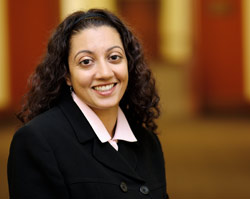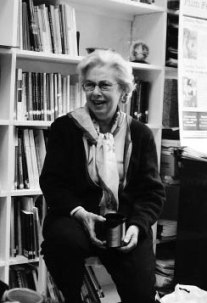Filed Under > Research/Publications
An Online Primer on Peace Education
Monisha Bajaj has developed the Encyclopedia of Peace Education on the College's Web site that charts the history and new directions of a still-evolving field
If you didn’t know, not to worry: There’s now a ready reference online for all things peace education that even Wikipedia can’t match—the Encyclopedia of Peace Education. The encyclopedia, which is posted on the TC Web site (www.tc.edu/centers/epe), is the brainchild of Monisha Bajaj, a faculty member in the Department of International and Transcultural Studies.
“Peace education is a body of scholarship and practice that has very fluid boundaries,” Bajaj says. “There really isn’t a space for practitioners, scholars and students and people from all over the world who are claiming membership in this community to interact and share ideas, to trace the development of the field, and to look at the proposals people are putting forward for the future of the field. I wanted to create that kind of space.”
Given Bajaj’s scholarly background, it might come as a surprise that her initial vision was not of an old-fashioned printed encyclopedia—even though she published one in May. In fact, the opposite is true: The print version is an offshoot of the Web publication.
What won’t come as a surprise is that such an encyclopedia—print or online—was developed at TC, for the institution has a proud history in the field. Indeed, the College is the only American institution of higher learning to offer a concentration in peace education, and the first courses in the field were taught at TC by Betty Reardon, Founding Director of TC’s Peace Education Center.
Because the field is so new, scholars and practitioners have been engaged in spirited debates about its contours—what is it, what are its foundational tenets, what should it seek to accomplish? It is Reardon who has come closest to defining the field. To her, peace education encompasses everything from educational policies to pedagogical practices that provide people the skills to work toward comprehensive peace.
From there, the field can range widely to issues of war and violence, human rights and social justice, and even sustainable development. Peace education has been most shaped by iconic TC philosopher and educator John Dewey, influential education theorist Paulo Freire and Italian educator Maria Montessori.
In 2006, when Bajaj joined the faculty after receiving her doctorate from TC, she saw an opportunity to pin down some of the sometimes disparate elements that began to cohere in the middle of the twentieth century into a full-blown field. With the help of graduate students, she fired off e-mails to colleagues who themselves had encyclopedic knowledge of some facet of the field asking if they’d be interested in writing an article.
Bajaj soon signed on dozens of researchers and practitioners to write short articles (most are between 1,500 and 2,000 words) on the field’s history, core concepts and emerging issues. It was only then that she decided to cull the articles that dealt with the most seminal issues into a printed version that could serve as a text in peace education courses.
Currently, the online encyclopedia includes 39 entries on everything from the curious, if accomplished, life of the aforementioned Elihu Burritt to Dewey and his influence on peace education. Bajaj herself has an article on “critical” peace education, as does Lesley Bartlett, Associate Professor of Education, who wrote about Freire.
Bajaj had hoped to publish the book and launch the site at the same time but technical glitches and her own travels (She spent time in India this spring setting up a yearlong research leave supported by the National Academy of Education and the Spencer Foundation.) made that impossible. The site went live in September, and as word has spread in the peace education community, scholars and practitioners have begun sending her more entries, and she’s even gotten inquiries about the peace education concentration.
As for the future, Bajaj can conceive of the site having 100 articles or more broken down into various categories. It is for her the beauty of having an encyclopedia exist online. “It’s just a more dynamic way of having information available,” she says. “And Teachers College has been so involved in the development of peace education that our Web site seems like the perfect place to have a site that lets people learn about the field and see where it is going.”
Published Wednesday, Dec. 24, 2008

